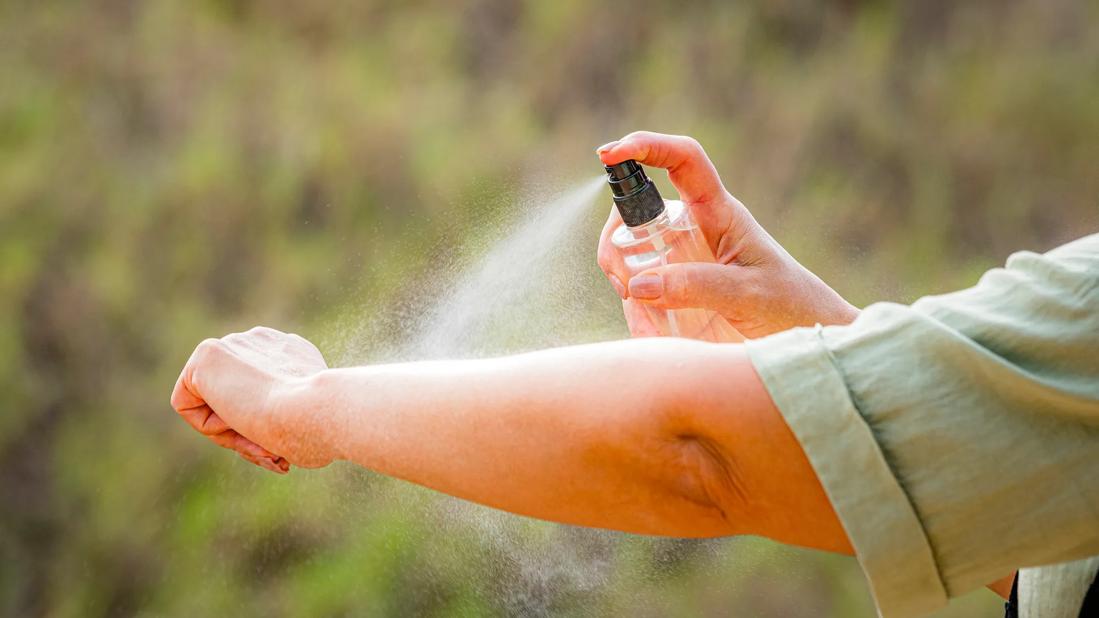Vanilla extract won’t keep mosquitoes away for long, if at all — and could even attract other bugs, like wasps or flies

Image content: This image is available to view online.
View image online (https://assets.clevelandclinic.org/transform/aeaf4454-0637-499b-9645-8650c658f097/repellent-spray-arm-outside-2157312745)
Person spraying bug repellent on their arm
We’re always trying to cook up new ways to keep bugs from bugging us, aren’t we? And if your social media feed has anything to say about the matter, the solution is supposedly right in your kitchen cupboard.
Advertisement
Cleveland Clinic is a non-profit academic medical center. Advertising on our site helps support our mission. We do not endorse non-Cleveland Clinic products or services. Policy
But does mixing a tablespoon of vanilla extract in a cup of water and spraying it on your body really repel mosquitoes?
Here’s the truth from emergency medicine physician Christopher Bazzoli, MD, a specialist in wilderness and environmental medicine.
Vanilla extract could potentially keep the mosquitoes at bay for a short amount of time — but not long. And it won’t do the trick to keep you safe from other stings and bites.
So, no, it’s not a reliable solution to keep the bugs from biting. And it’s not your best choice for protecting yourself from diseases that bugs can spread, like:
Dr. Bazzoli shares a few reasons why vanilla extract shouldn’t be your go-to mosquito repellent.
Effective repellents rely on scents that bugs don’t like — smells they find so disgusting that they leave you alone as they search elsewhere for a snack. Vanilla extract doesn’t do that.
“Vanilla might mask your body odor for a short time,” Dr. Bazzoli explains. “But it’s not actually repelling insects. At best, you’d get some mild masking, not protection.”
Think of it like this: Vanilla extract is like spraying yourself down with perfume instead of showering after a grueling workout ... you’re not fooling anyone.
Advertisement
Once the vanilla scent fades or mixes with your sweat, the carbon dioxide you breathe out and the bacteria on your skin draw mosquitoes right back in.
“Mosquitoes can sense your scent from far away,” he adds. “It’s like a homing beacon.”
Without something more powerful to actually repel the biting bugs, you may as well be ringing the dinner bell.
Even the vanilla-extract-bug-spray enthusiasts will tell you that it doesn’t last long. Most suggest re-applying the concoction about every 30 minutes.
If you’re out enjoying a summer cookout or a hike in the woods, are you really going to remember to douse yourself (and, possibly, a couple of kids) every half hour? Unlikely.
“Expecting someone to apply vanilla every 30 minutes just isn’t realistic for most of us,” Dr. Bazzoli points out.
Even if (and that’s a big IF) vanilla extract repellent keeps the mosquitoes away briefly, it’s not effective against other pests.
In fact, using vanilla extract could even attract other bugs, like wasps or flies.
“The scent could draw in pests that love sweet smells,” Dr. Bazzoli notes. “It’s not a great tradeoff.”
And those Lyme-disease-carrying ticks? Vanilla won’t drive them away either.
“Ticks aren’t driven by scent the way mosquitoes are. Instead, they’re opportunistic — they latch on when you brush past them,” Dr Bazzoli warns. “Masking your smell isn’t going to make a difference against them. What you really need is an actual repellent, something that smells bad to the bugs, not just neutral.”
So, if vanilla isn’t going to keep you safe from itchy bites and insect-borne diseases, what will?
Sorry, things like bug bracelets, citronella and the like aren’t the answer either. Instead, Dr. Bazzoli recommends these evidence-based insect repellent ingredients:
Not sure which is right for you? Check the U.S. Environmental Protection Agency website for customized results.
Advertisement
If you’re spending any time out where bugs roam free, quality bug repellent is a must. Not just to keep you from itching, but also to protect you from potentially serious illnesses.
And vanilla just isn’t it.
“All in all, I’d give vanilla extract two big thumbs down as an effective deterrent for mosquitoes and other insects,” Dr. Bazzoli states.
So, skip the vanilla, and stick to trusted bug repellents. And, pro tip: Apply it after your sunscreen. You’ll thank us in the morning.
Advertisement

Sign up for our Health Essentials emails for expert guidance on nutrition, fitness, sleep, skin care and more.
Learn more about our editorial process.
Advertisement
Keep ‘mozzies’ at bay by avoiding scented body products, beer and certain colored clothes
Alpha-gal syndrome has become more common and is a leading cause of anaphylaxis
These red, raised bites often show up in a zigzag pattern on areas of your skin that come into contact with bedding
Twice daily tick checks, the right bug sprays and long pants can help you prevent tick-borne diseases
Bug bites create tiny openings in your skin that can let in dangerous bacteria
Using insect repellent, covering up and keeping your property dry can help keep the buggers at bay
Kissing bugs are insects that can carry a dangerous parasite that causes Chagas disease
Whether you scrape or pull out the stinger, the key is to do it quickly
Prioritize your health by managing stress, strengthening your social connections and getting quality sleep
Bolsters, blankets, pillows and blocks can offer extra support, stability and comfort
Allergies, postnasal drip, asthma or reflux could be to blame for a cough that won’t quit